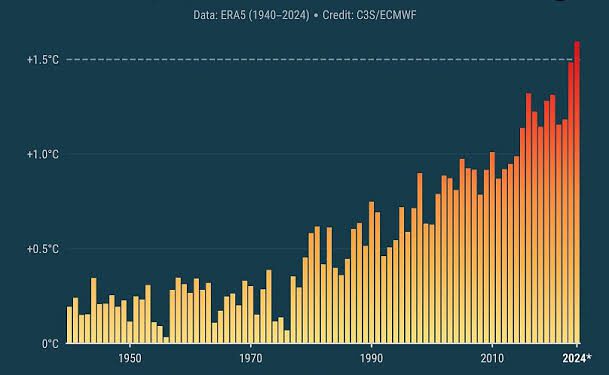European Union scientists from the Copernicus Climate Change Service (C3S) have declared 2024 as the hottest year since records began, surpassing the previous record set just a year earlier in 2023. Data collected from January to November indicates that global average temperatures have exceeded 1.5°C (2.7°F) above pre-industrial levels for the first time—a critical threshold outlined in the Paris Agreement.
The alarming milestone is attributed to human-induced climate change, exacerbated by the residual effects of the El Niño weather phenomenon. According to Julien Nicolas, a climate researcher at C3S, “We’re still in near-record-high territory for global temperatures, and that’s likely to stay at least for the next few months.”
Extreme Weather Events on a Global Scale
The unprecedented heat in 2024 has fueled a series of devastating weather events across the globe. Italy and South America have experienced severe droughts, while Nepal, Sudan, and parts of Europe have been ravaged by fatal floods. Heatwaves in Mexico, Mali, and Saudi Arabia have claimed thousands of lives, and destructive cyclones have wreaked havoc in the United States and the Philippines.
Scientific studies confirm that human-caused climate change has been a driving factor behind these extreme events. Despite global pledges to curb emissions, the world’s reliance on fossil fuels has pushed carbon dioxide emissions to a record high this year, further intensifying the crisis.
The Long Road to Mitigation
The news comes in the wake of the United Nations climate talks, where a $300 billion deal was struck to address climate change. However, this package has faced criticism from poorer nations, who argue that the funding is insufficient to tackle the mounting costs of climate-related disasters.
Experts warn that without significant emissions reductions, the long-term warming trend will persist. While a potential La Niña event in 2025 could briefly cool global temperatures, Friederike Otto, a senior lecturer at Imperial College London, cautioned, “While 2025 might be slightly cooler than 2024, this does not mean temperatures will be ‘safe’ or ‘normal.’ We will still experience high temperatures, resulting in dangerous heatwaves, droughts, wildfires, and tropical cyclones.”
A Call for Urgent Action
The C3S report underscores the urgent need for global action to mitigate the effects of climate change. Cutting emissions to net zero, as pledged by many governments, remains the most effective way to halt the worsening crisis. However, current progress has been insufficient to meet these goals.
As the world grapples with the consequences of 2024’s record-breaking heat, scientists emphasize that the focus must shift to proactive solutions. The stark reality of surpassing the 1.5°C threshold highlights the urgency of implementing sustainable policies to secure a livable future for generations to come.
The year 2024 serves as a grim reminder of the escalating climate emergency and the pressing need for collective global action to address the root causes of this crisis.
Related Stories:
EU Scientists Confirm 2023 as the Hottest Year on Record
2023 Poised to Break Records as Hottest Year, Scientists Warn
Hottest day in 260 years recorded in Italy’s Milan
2023: A Defining Year in Climate Crisis – Humanity at the Crossroads
















